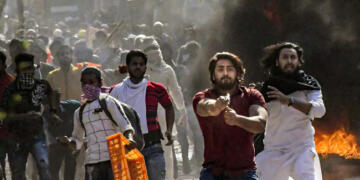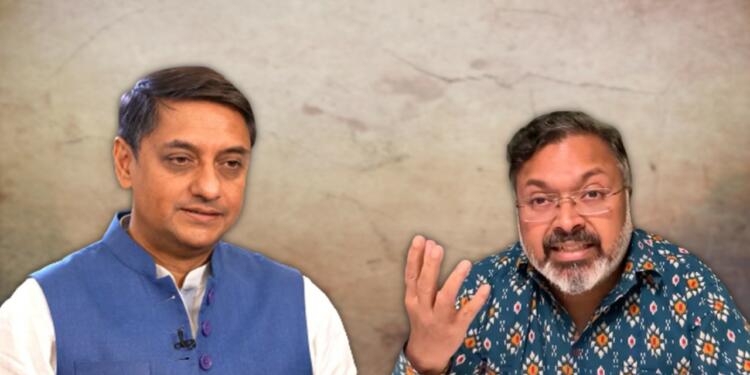Sanjeev Sanyal Debate: The debate over what to call our beloved nation, India or Bharat, is far from over. Social media has become the battleground for this linguistic clash, with a vast majority backing Bharat, while some still cling to the colonial-era tag of India. Recently, the self-proclaimed Indologist and rabble-rouser, Devdutt Pattnaik, added fuel to the fire by making some rather bizarre claims about the origin of our country’s name.
In a televised debate on India Today, hosted by Rahul Kanwal, the stage was set for a clash of ideologies when historian and economist Sanjeev Sanyal entered the fray. Pattnaik attempted to relate the name ‘Bharat’ to left-favorite topics such as casteism, Brahminism, and intolerance, going as far as proclaiming it as a symbol of “Brahminical Patriarchy.”
However, Sanjeev Sanyal remained calm and resolute as he presented the basics of history, culture, and etymology to Pattnaik. When Kanwal asked Pattnaik how he responded to the claims that ‘Bharat’ is of Bharatiya origin and ‘India’ is foreign, Pattnaik argued that the idea of singularity is a ‘Middle Eastern ideology,’ while the concept of plurality is Indian. He suggested that Indians should celebrate diversity and encourage multiple names for their country.
Sanjeev Sanyal, however, responded nonchalantly, stating, “I don’t even understand what the debate is about. Bharat is a well-established name for India, enshrined in the Constitution. Indian languages use ‘Bharat,’ and we habitually say ‘India’ when communicating in English. Using the word Bharat is not an intrusion into the English language, as some people claim.”
Bharat is a well established name for India: @sanjeevsanyal, Historian & Economist #NewsTrack #ITVideo | @rahulkanwal pic.twitter.com/B0DUvPJPlm
— IndiaToday (@IndiaToday) September 6, 2023
"India and Bharat, both are valid words and we should use them": @sanjeevsanyal, Historian & Economist #NewsTrack #ITVideo | @rahulkanwal pic.twitter.com/BF1Np1RGlT
— IndiaToday (@IndiaToday) September 6, 2023
Also read: India is not even Bharat officially, and liberals are already howling
Sanyal relied on cold facts and evidence to counter Pattnaik’s rhetoric. He clarified that the term ‘India’ is indeed foreign with Indian origins, but ‘Bharat’ has two distinct origin stories. The older one dates back to the Rigveda, where a tribe named ‘Bharata’ lived in the Sapta Sindhu region.
Where did word 'Bharat' come from? Explains @devduttmyth, Mythologist and Author#NewsTrack #ITVideo | @rahulkanwal pic.twitter.com/Gm3FN78NZH
— IndiaToday (@IndiaToday) September 6, 2023
During the early Bronze Age, the Bharata tribe resided in what is now Haryana, calling their homeland ‘Sapta Sindhu.’ They faced a coalition of ten other tribes attacking from the West, resulting in a monumental battle on the banks of the Parushni (Ravi in modern terms). The Bharatas emerged victorious, defeating another tribe named Bhedas along the banks of the Yamuna. This marked the establishment of India’s first empire, led by their chieftain Sudas, who performed the first Ashwamedha Yagya and became the first Chakravartin Samrat of India. The symbol of the wheel, seen later in the Mauryan dynasty’s symbol and our national flag, can be traced back to the early Bronze Age and the Bharata tribe.
Sanjeev Sanyal, with a matter-of-fact tone, pointed out that while some of Pattnaik’s claims were accurate, his interpretation was muddled and even incorrect in some instances. He used examples to illustrate this, mentioning that Pattnaik’s claim that the Battle of Ten Kings occurred in Kurukshetra was entirely erroneous. The battle transpired on the banks of Parushni (Ravi) in Western Punjab. He did acknowledge the presence of a Jain King Bharat, a Chakravartin Samrat and descendant of Jain King Rishabhdeva, the founder of Jain traditions, but clarified that Pattnaik’s assertions were convoluted.
In the ongoing debate over the name of our nation, the clash between ‘India’ and ‘Bharat’ is not just a linguistic one; it’s a battle of historical narratives and cultural identities. While Devdutt Pattnaik may have stirred the pot with his provocative claims, Sanjeev Sanyal’s calm presentation of historical facts provides a more grounded perspective.
Ultimately, the choice between ‘India’ and ‘Bharat’ remains a matter of personal preference, influenced by linguistic, cultural, and historical factors. Both names hold significance and are deeply ingrained in our nation’s heritage. In a diverse and pluralistic country like ours, celebrating this diversity, as Pattnaik suggests, can coexist with acknowledging our historical roots, as Sanjeev Sanyal eloquently articulates. The battle for names may continue, but it is a testament to the richness of our nation’s history and identity.
Support TFI:
Support us to strengthen the ‘Right’ ideology of cultural nationalism by purchasing the best quality garments from TFI-STORE.COM






















